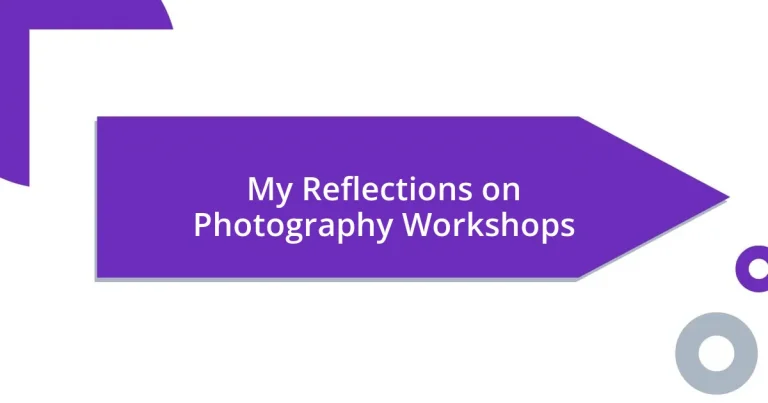Key takeaways:
- Photography workshops foster both technical skills and emotional connections, enhancing participants’ understanding and expression through hands-on experiences.
- Carefully selecting the right workshop based on personal goals, instructor expertise, and group size can significantly influence the learning journey.
- Engaging with instructors and peers during workshops enriches the experience through shared knowledge, constructive criticism, and community building.
- Post-workshop reflection and practice, along with sharing work for feedback, are vital for continued growth and skill enhancement in photography.

Understanding Photography Workshops’
When I first signed up for my photography workshop, I was both excited and nervous. The idea of learning alongside other passionate photographers in a hands-on environment was thrilling. It made me think: how often do we get to immerse ourselves fully in something we love while sharing that experience with others?
Photography workshops serve as a fantastic space for growth, offering not just technical skills but also community. I can still recall the moment when a fellow attendee shared their perspective on composition, reshaping how I viewed my own work. It’s incredible how different lenses—both literally and metaphorically—can enhance our understanding of photography.
Beyond the technical lessons, these workshops often emphasize the emotional aspect of photography. They challenge us to connect with our subjects on a deeper level. Have you ever felt the rush of capturing an image that speaks to your soul? That’s the gift these workshops often provide: a reconnection with the artistry of photography, making it not just about the camera but about expression and storytelling.

Choosing the Right Workshop’
Choosing the right photography workshop is crucial for getting the most out of your experience. There are numerous factors to consider, and I can’t stress enough how it shapes your learning journey. For me, one of the most important aspects was the workshop’s focus—whether it was on landscape, portrait, or street photography. Each specialization offers unique challenges and rewards which can either align or misalign with your goals.
Here are a few tips to help you choose wisely:
– Identify Your Goals: Know what skills or subjects you want to explore.
– Research Instructors: Look for experience and reviews from past participants.
– Consider Group Size: Smaller groups often allow for more personalized feedback.
– Check Location and Setting: Make sure it’s a place that inspires you.
– Review the Curriculum: Ensure it covers the topics you’re interested in.
Once, I attended a workshop that focused solely on night photography, which I had little experience with at the time. The intimacy of the group and the knowledgeable instructor turned it into a transformative experience for me. I felt a mix of excitement and anxiety as we ventured into the dark, but those feelings quickly changed into amazement when we started capturing stunning nightscapes. That challenging environment pushed me beyond my comfort zone and opened my eyes to the magic of low-light photography. Each choice I made, from the workshop selection to my approach to capturing the moment, defined my growth as a photographer.

Preparing for Your Workshop’
Preparing for a photography workshop can feel overwhelming, but with the right mindset, it transforms into an exciting opportunity for growth. I remember getting my gear ready the night before, carefully packing my camera, lenses, and even a notebook to jot down any key insights during the sessions. It’s that anticipation that fuels your enthusiasm, making sure you’re equipped to fully dive into the experience.
One aspect I highly recommend is creating a list of questions or topics you want to explore. Think back to the last time you felt curious or confused about a particular technique—this is your chance to clarify those notions. When I attended a workshop focused on portrait lighting, I had a list prepared, and I found that not only did I learn a lot, but I was also able to engage more meaningfully with both the instructor and my fellow participants.
It’s also beneficial to mentally prepare yourself for collaboration and critique. Workshops thrive on sharing perspectives and feedback. I recall feeling nervous when my first image was critiqued, but it was a turning point that taught me the value of constructive criticism. Embracing this mindset can truly enrich your workshop experience.
| What to Prepare | Why it Matters |
|---|---|
| Camera Gear | Ensures you have the right tools to capture your creative vision |
| Notebook for Notes | Helps you retain the knowledge shared during the sessions |
| List of Questions | Encourages deeper engagement with the instructor and peers |
| Open Mindset | Fosters growth through feedback and collaboration |

Engaging with Instructors’
Engaging with instructors in a photography workshop is one of the most rewarding aspects. I’ve found that the more I interacted with them, the more I could unlock layers of knowledge that textbooks simply can’t provide. For instance, during an advanced landscape photography workshop, I was hesitant to share my thoughts. But once I opened up, the instructor offered personalized critiques that transformed my approach. Have you ever had that moment where a simple piece of advice changes your perspective entirely?
Building a rapport with your instructor can truly enhance the learning experience. I learned this firsthand during a street photography workshop when I boldly asked the instructor about his favorite shooting spots. His eyes lit up, and he shared some hidden gems I’d never considered. This not only made the experience more interactive but also added a sense of excitement to my exploration. Isn’t it amazing how a small conversation can lead to unforgettable discoveries?
Don’t shy away from asking questions, no matter how basic they might seem. I once asked about the settings for a particularly challenging shot I was trying to achieve, and what followed was a deep dive into the concepts of ISO, aperture, and shutter speed. This kind of engagement made me feel invested in my learning journey and fostered a sense of community among the participants. What can you gain from just one question? The possibilities are endless.

Practicing Skills Post Workshop’
Once the workshop wraps up, it’s crucial to keep that momentum going. I fondly remember diving back into photography immediately after attending a workshop. I took my camera on a spontaneous outing, capturing candid moments in my neighborhood. There’s something exhilarating about applying newly learned techniques on the spot—did you ever notice how creating in the moment pushes boundaries? It’s the practice that cements the knowledge you’ve gained.
Revisiting the techniques taught during the workshop can be a game changer. One weekend, I decided to focus on composition skills I had sharpened during a recent session. I set up a small still-life scene at home, experimenting with different angles and lighting. The thrill of seeing my images come to life was nothing short of rewarding. I realize now how invaluable it is to give yourself the space to explore and play with what you’ve learned. How do you incorporate past lessons into your creative process?
Engaging with a community of fellow photographers is another vital aspect of practicing skills. I joined an online forum where participants share photos and offer feedback. This experience has been enriching, as it mirrors that workshop environment where collaboration thrives. I find myself looking forward to seeing what others create, and I often draw inspiration from their work. Isn’t it fascinating how sharing your journey can also ignite the creativity of others? By surrounding yourself with like-minded individuals, you can continue to develop those hard-won skills and gain new perspectives.

Sharing Your Work and Feedback’
Sharing your photographs with others can feel both exhilarating and nerve-wracking. I remember the first time I posted a series of images from a workshop on social media. I was met with a flurry of comments and constructive criticism. It was a rush to see how my work resonated with an audience, but it also prompted me to reflect on my style and areas for growth. Have you ever felt that mix of pride and vulnerability when putting your work out there?
Receiving feedback, especially from peers in a workshop setting, can be a transformative experience. During one session, I shared a portrait that I thought was my best work. It turned out that my peers saw potential in an entirely different shot I hadn’t even considered. Their insights taught me the value of looking at my photos through someone else’s lens. What if the images we overlook hold the key to our next breakthrough?
Moreover, I’ve discovered that giving feedback is as enriching as receiving it. While reviewing others’ photos, I found myself articulating thoughts about composition and lighting that echoed what I learned during workshops. This mutual exchange fosters a sense of camaraderie, turning what could be a solitary practice into a dynamic dialogue. Isn’t it incredible how sharing not only enhances our skills but builds a supportive community around us?

Reflecting on Your Growth’
Reflecting on my growth in photography is like unfolding a series of layers, each revealing something new. After attending workshops, I found myself constantly revisiting the foundational techniques, almost as if trying to knit them into the fabric of my creative identity. One evening, while editing my photos, I stumbled upon an image that showcased my progress. I recognized elements in my composition that I hadn’t consciously implemented before. This moment made me ponder: how often do we overlook small victories in our journey?
As I continued delving into my craft, I started keeping a journal. Writing down my experiences—what I learned, what excited me, and even my frustrations—helped me map my progression. One time, I reflected on a project that didn’t go as planned; yet, it sparked a breakthrough in my understanding of contrast and depth. It’s fascinating how setbacks can sometimes be the catalyst for growth. Does anyone else find strength in vulnerability?
Moreover, as I reviewed my portfolio over time, it became increasingly clear just how much I had evolved since those early days of snapping pictures. I noticed a shift towards experimenting with light and shadow, which breathed life into my work. This reflection emphasized the importance of celebrating growth, no matter how incremental it may seem. Have you taken a moment to appreciate how far you’ve come in your own photographic journey?












